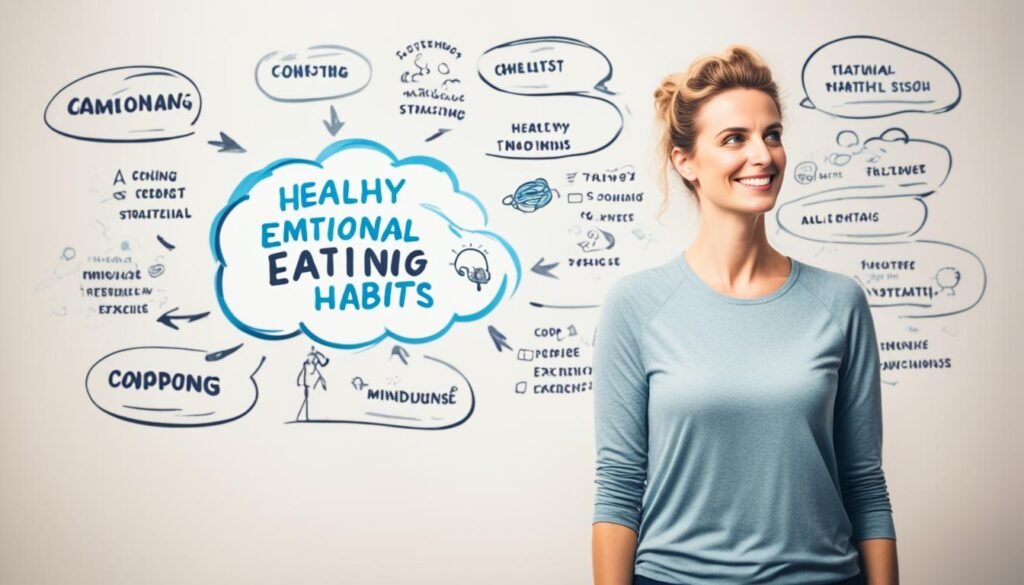Have you ever turned to food when stressed, even though it’s bad for your health? Emotional eating affects many, leading to bad eating habits and self-image issues. It’s key to understand this to improve your food relationship. This article will show you how to spot emotional eating triggers and eat mindfully. This can lead to better well-being and mental health.
Key Takeaways
- Emotional eating can lead to unhealthy eating patterns.
- Recognizing the triggers behind emotional eating is crucial for change.
- Mindful eating practices can help develop a healthier relationship with food.
- Keeping a food and mood diary can increase awareness of emotional eating habits.
- Incorporating physical activity can be a positive alternative to food for managing emotions.
Understanding Emotional Eating
Emotional eating means eating to handle feelings, not just hunger. Many eat comfort foods to deal with stress, anxiety, or sadness. This can lead to bad effects on both body and mind.
What is Emotional Eating?
It’s more common than you might think. Emotional eating isn’t just about enjoying food. It’s about using it too much to feel better. This often leads to cravings for high-calorie foods.
This doesn’t solve the emotional problems, causing guilt or shame. These feelings can make emotional issues worse and hurt mental health.
Impact on Mental Health
The effects of emotional eating go beyond just feeling full. Guilt and shame can start a harmful cycle. It’s important to recognize this pattern as it shows deeper emotional issues.
Studies show a link between eating habits and mental health. Dealing with emotional eating can improve mental health and food relationships. People who work on their emotions often feel better and eat healthier.
Identifying Emotional Eating Triggers
Understanding what affects your eating habits can lead to better health choices. Emotional eating triggers play a big part in how you handle stress and life situations. By knowing these triggers, you can learn to cope with emotional eating better. Being aware of your eating patterns helps you move from reacting to eating to eating mindfully.
Common Emotional Triggers
Many emotional triggers make people turn to food for comfort. Common ones include:
- Stress
- Loneliness
- Boredom
- Anxiety
These feelings often make you grab snacks or comfort foods. Knowing your emotional eating triggers is key to managing them.
Situational Influences on Eating Behavior
Certain situations can make you want to eat unhealthy foods. For example, social events might lead to eating too much, especially if unhealthy foods are there. Work deadlines can also cause stress, making you eat emotionally to cope. By looking at these situations and keeping track of your eating, you can see how they affect your habits. Keeping a food diary can show you patterns in your eating linked to certain feelings or events. Understanding and managing these triggers is key for staying healthy

Emotional Hunger vs Physical Hunger
It’s important to know the difference between emotional and physical hunger. This knowledge helps you handle hunger cues better and improve your eating habits.
Characteristics of Emotional Hunger
Emotional hunger comes on suddenly and is often linked to cravings for comfort foods like chocolate or ice cream. It’s triggered by feelings like stress, sadness, or boredom, not by actual hunger. You might feel:
- Cravings for specific foods
- Urgent feelings to eat regardless of hunger
- Feelings of guilt or shame after eating
- Eating in response to emotions rather than hunger
Signs of Physical Hunger
Physical hunger grows over time and shows through physical signs. It usually calls for a variety of foods and can be filled with a nutritious meal. You might see:
- Gradual increase in hunger levels
- General feelings of emptiness in the stomach
- Ability to choose from several food options
- Understanding of when you’re full and satisfied
Knowing and understanding these hunger cues helps you manage your eating habits better. Learning about emotional triggers for overeating is key. You can also check out resources like this article on emotional eating strategies to gain more insight and healthier ways to cope.
Avoid Emotional Eating: The Importance of Awareness
Building emotional eating awareness means looking closely at how you eat and why. Notice when you eat because of your feelings, without judging yourself. This helps you deal with your emotions in a better way. It’s a key step to stop emotional eating and make smarter food choices.
Recognizing the Behavior Without Judgment
It’s important to know what makes you eat emotionally. Many people find that looking back at their actions helps them understand their eating habits better. You can watch your food choices without blaming yourself, seeing how stress, sadness, or boredom affects them. Aim for a non-judgmental attitude to avoid feeling guilty about emotional eating.
Keeping a Food and Mood Diary
Using a food and mood journal can greatly improve your emotional eating awareness. Write down what you eat and how you feel at each meal or snack. This helps you see patterns, linking your emotions to your food choices. Over time, you’ll notice how certain situations or feelings lead to emotional eating. With this insight, you can choose better ways to handle your emotions instead of eating.

Healthy Coping Mechanisms for Emotional Eating
It’s key to find healthy ways to deal with emotions without eating. Instead of eating when stressed or sad, try other things that make you feel good. Doing fun activities can shift your focus and make you feel better.
Finding Alternatives to Food
Look for things that grab your attention and take your mind off cravings. Good alternatives to food are:
- Meditation and mindfulness practices to promote relaxation.
- Reading books or engaging in creative hobbies to foster personal expression.
- Connecting with friends or family for support and social interaction.
These activities are not just distractions. They also help balance your emotions. By finding other things to do, you can handle emotional eating better.
Engaging in Physical Activity
Exercise is great for your mind and fights emotional eating. It makes you feel good by releasing endorphins. Make time for activities you like, such as:
- Walking or jogging outdoors.
- Joining a local sports team or fitness class.
- Practicing yoga or dancing to both energize and uplift your spirit.
Exercise boosts your mood and supports a healthier life. By making exercise a priority, you help your emotional and physical health work together.
For more information on how personal data is processed and your rights, visit this privacy policy page.
Mindful Eating Practices
Adding mindful eating to your daily life can change how you see food. It means eating with full attention, noticing when you’re hungry, and understanding why you eat. This way, you enjoy your meals more and eat healthier.
How to Practice Mindful Eating
To practice mindful eating, follow these steps:
- Eliminate distractions: Eat in a quiet place without TV or phones.
- Savor each bite: Chew slowly and enjoy the taste to help with digestion and feeling full.
- Listen to your body: Notice when you’re hungry or full to eat naturally.
- Reflect on emotions: Think about your feelings during meals and how they affect your eating.
Benefits of Mindfulness in Eating
Mindful eating does more than just feed you. It can lead to:
- Feeling more satisfied with meals, which can reduce cravings.
- Less impulsive eating and better choices.
- Knowing how much to eat to avoid overeating.
Learning about mindfulness can help you stick with it. If you want to make paying easier and focus on emotional health, check out PayEasyWay for new ways to manage money.

| Practice | Description |
|---|---|
| Observe | Pay attention to what you’re eating without distractions. |
| Engage | Use all your senses to experience your food fully. |
| Reflect | Consider your feelings and hunger levels before, during, and after eating. |
| Adjust | Make modifications based on your observations about food and emotions. |
Creating a Supportive Environment
A supportive environment is key to fighting emotional eating. Being around positive friends and family helps you on your path to better eating habits. Strong connections give you the support you need to say no to temptations.
Connecting with Supportive Friends and Family
Having encouraging relationships is crucial. When you’re with people who get your struggles, you can open up and share your plans. Their backing keeps you on track and boosts your motivation. Being part of a supportive circle makes you feel better and helps you stick to healthy habits.
Removing Temptations from the Home
To make your home a place for healthy eating, get rid of tempting foods. Begin by checking what’s in your kitchen and pantry. Clear out foods that make you eat when you’re not hungry. Fill your space with good foods and snacks instead. Taking steps to avoid temptations helps you avoid eating out of emotion.
Emotional Eating Prevention Strategies
To stop emotional eating, it’s key to set healthy eating goals and plan meals well. Having clear, achievable goals helps you build a good relationship with food. This way, you won’t turn to food when you’re upset.
Setting Healthy Eating Goals
Setting clear, reachable eating goals is key to controlling emotional eating. Focus on these areas:
- Portion control: Knowing how much to eat helps you make better food choices.
- Incorporating variety: Make sure your diet includes a mix of fruits, veggies, and whole grains.
- Hydration: Drinking enough water can help you feel less hungry.
Check these goals often to make sure they still fit your life and needs. This keeps you on track with a balanced diet and helps prevent emotional eating.
Meal Planning for Success
Planning meals is key to eating well. It stops you from eating on impulse. Here are some tips:
- Make a weekly menu with meals and snacks that meet your goals.
- Make a shopping list for your meals to avoid tempting foods at the store.
- Get creative with leftovers to save food and make cooking easier.
Spending time on meal planning saves you time later and keeps you eating well. For more tips on using your resources wisely, check out these guidelines.

| Goal | Action Step | Benefits |
|---|---|---|
| Portion Control | Measure food with cups and kitchen scales | Prevents overeating |
| Food Variety | Include different food groups in every meal | Boosts nutrition and satisfaction |
| Hydration | Carry a water bottle and set reminders | Reduces unnecessary snacking |
These strategies help you manage your food relationship positively. Being consistent with these steps leads to a healthier life and less emotional eating.
Overcoming Emotional Eating Habits
To break free from emotional eating, you need to be proactive and aware of your habits. Start by identifying what triggers your eating. Then, make small, intentional changes in how you see food. Understanding emotional hunger and its impact on your eating choices is key to making better decisions.
Breaking the Cycle of Emotional Eating
Overcoming emotional eating means looking into your feelings and actions around food. Notice when you eat because you’re upset, not hungry. Think about what makes you eat this way and find better ways to handle it. Small changes over time can make a big difference.
Using resources to learn how to manage emotional eating can also help. Check out tips on emotional eating management for useful strategies.
Tracking Progress Over Time
Keeping track of your eating habits helps you stay aware and accountable. Write down what you eat, how you feel, and what you crave. A food and mood diary can show you patterns and trends.
This helps you understand how your feelings affect your eating. Over time, you’ll be better at telling apart emotional and physical hunger. This leads to healthier choices and helps you beat emotional eating.
Building a Healthy Relationship with Food
Changing how you see food is key to a better relationship with it. Seeing food as nourishment, not just a way to cope with feelings, is important. This change lets you enjoy eating without feeling guilty. It also means you can accept that it’s okay to indulge sometimes.
Redefining Food as Nourishment
Seeing food as nourishment helps you eat better. You can think about the nutrients in your food and still enjoy your favorite meals. Making choices that are good for your health, but not too strict, makes you feel good. This way, you have a healthy view of food and eat better.
Avoiding Guilt Around Eating
Letting go of guilt when eating makes eating better. Feeling bad about food can lead to eating too much or too little. By eating in moderation, you don’t feel forced to follow strict diets. Knowing you’re valuable, no matter what you eat, helps you have a better relationship with food. For more information, check out useful resources on improving your food relationship and breaking bad habits.

| Aspect | Healthy Relationship | Poor Relationship |
|---|---|---|
| Mindset | Food as nourishment and enjoyment | Food as emotional support |
| Indulgence | Occasional without guilt | Causes shame and restriction |
| Eating Habits | Mindful and intentional | Reactive and impulsive |
| Self-Image | Value not tied to food choices | Guilt defines worth |
Engaging in Self-Care Techniques
Putting self-care first can really help your emotional health. It can also make it easier to handle tough feelings. Things like yoga and deep breathing can fight off the urge to eat when stressed. Adding activities that boost your emotional health builds resilience. This means you can deal better with hard times.
Stress Reduction Strategies
Using good stress reduction methods is key to your health. Here are some tips to think about:
- Yoga: Yoga makes you more flexible and helps you relax.
- Deep Breathing: Deep breathing exercises calm your nerves.
- Mindfulness Meditation: Being in the moment helps you notice your feelings better.
- Nature Walks: Being in nature lowers stress and lifts your mood.
Practicing Gratitude and Positivity
Practicing gratitude can change your focus from negative to positive. Adding these practices to your daily life can make you feel better emotionally. Here are some ways to practice gratitude:
- Write down three things you’re thankful for each day in a gratitude journal.
- Tell people you appreciate them to build stronger relationships.
- Think about good times before bed to keep a positive mindset.

Professional Help and Support
Getting help is key when fighting emotional eating habits. Many people find emotional eating counseling helps them understand their eating habits better. Knowing when to get counseling can change everything, as experts offer tailored advice to handle emotional triggers.
When to Seek Counseling
If emotional eating is how you often deal with stress or bad feelings, it’s time to think about getting help. Signs you might need counseling include:
- Feeling overwhelmed by negative emotions
- Using food as a main way to cope
- Wanting to improve your food relationship
- Struggling to tell apart physical and emotional hunger
The Role of Nutrition Counseling
Nutrition counseling goes hand in hand with emotional eating counseling. A dietitian can create a meal plan that fits your nutritional needs and helps your emotional health. By focusing on balanced eating, you can improve your food relationship and eat less out of emotional reasons.
Learning how what you eat affects how you feel can help you make better choices. For more info, check out additional resources on the topic.

Strategies for Managing Emotions Without Food
Managing emotions without food means finding new ways to express your feelings and building your strength. Doing things you enjoy can make you happy and give you a sense of purpose. Also, learning to handle discomfort helps you grow emotionally and stops bad eating habits.
Exploring Activities That Provide Fulfillment
When looking for fulfilling activities, think about these ideas:
- Engaging in hobbies such as painting, gardening, or crafting
- Participating in community service or volunteering for local charities
- Building social connections through clubs or group activities
- Practicing mindfulness and yoga
- Investing time in reading or educational pursuits
These activities can make you feel better and help you manage your emotions without food.
Learning to Sit with Discomfort
Sitting with discomfort means facing your feelings instead of hiding from them. Here are some ways to build emotional strength:
- Practice deep breathing exercises to stay in the moment.
- Remember that feeling uncomfortable is a normal part of life and can help you grow.
- Think about your feelings by writing in a journal or meditating.
- Ask for help from friends or get professional help if you’re feeling too much.
These methods help you become more resilient by facing life’s challenges and dealing with your emotions directly.

The Role of Nutrition for Emotional Wellness
Nutrition is key to feeling good emotionally. It affects your mood and mental health. Eating well helps your body and mind stay stable. Let’s see how some foods can make you feel better and why eating right is important.
Foods That Support Mood and Mental Health
Adding mood-boosting foods to your meals can really help your emotional health. Here are some top picks:
- Omega-3 fatty acids: You can find these in fatty fish like salmon and seeds. They help your brain work better and lift your mood.
- Lean proteins: Foods like chicken, turkey, and beans keep your energy steady all day.
- Whole grains: Eating oats, brown rice, and quinoa gives your brain what it needs to stay healthy.
- Fruits and vegetables: These are full of antioxidants that protect your brain cells and make you feel happier.
The Importance of Balanced Nutrition
It’s crucial to eat a balanced diet for your emotional health. A good diet helps control your feelings, keeps your energy up, and stops you from eating too much when you’re stressed. Each type of food has its own special role:
| Food Group | Benefits for Emotional Wellness |
|---|---|
| Fruits | They’re full of vitamins and antioxidants, which can make you feel better. |
| Vegetables | Give you the nutrients you need and help you feel less tired. |
| Whole Grains | Give you steady energy and help you avoid mood changes. |
| Proteins | Help keep your blood sugar stable and boost serotonin levels. |
| Healthy Fats | Support brain health and make thinking clearer. |

By focusing on nutrition for emotional wellness, you can make a space where good feelings grow. Eating mood-boosting foods in a balanced way helps you manage your emotions better. This leads to a happier life.
Stress Eating Solutions
Dealing with stress eating means knowing what triggers you and finding ways to cope. It’s important to understand how stress affects your eating habits. By identifying stressors, you can start to find better ways to handle stress eating.
Identifying Personal Stressors
Knowing what stresses you out is key to fighting stress eating. Pay attention to when you eat out of stress. Common stressors include:
- Work-related pressures
- Relationship difficulties
- Financial concerns
- Lack of time for self-care
Writing down these moments can help you see what triggers your emotional eating. This can make you better at managing those triggers.
Implementing Stress Management Techniques
Using what you know about your stressors and stress management techniques helps you control emotional eating. Some effective methods are:
- Mindfulness practices: Meditation and deep breathing can lower stress and help you understand your feelings better.
- Exercise: Being active releases endorphins, which can make you feel happier and less stressed.
- Relaxation exercises: Activities like yoga or progressive muscle relaxation can also help.
Using these strategies can lead to healthier ways to deal with stress. This can improve your relationship with food and your overall well-being.

Conclusion
Managing emotional eating takes a full approach that includes being aware and taking action. Recognizing what triggers your eating and finding ways to cope can lead to lasting changes. These steps are key to a better relationship with food, moving past quick fixes to lasting habits.
Adding physical activity and mindfulness to your life can boost your emotional and physical health. Studies show that staying active helps control emotional eating and keeps you on track with your health goals. Also, research like that in scientific studies shows the link between mental and physical health for the best results.
Your path to managing emotional eating is about connecting deeper with yourself and your body. By choosing healthier habits and getting support when you need it, you pave the way for a life free from emotional eating. This leads to better emotional strength and a balanced way of eating.

